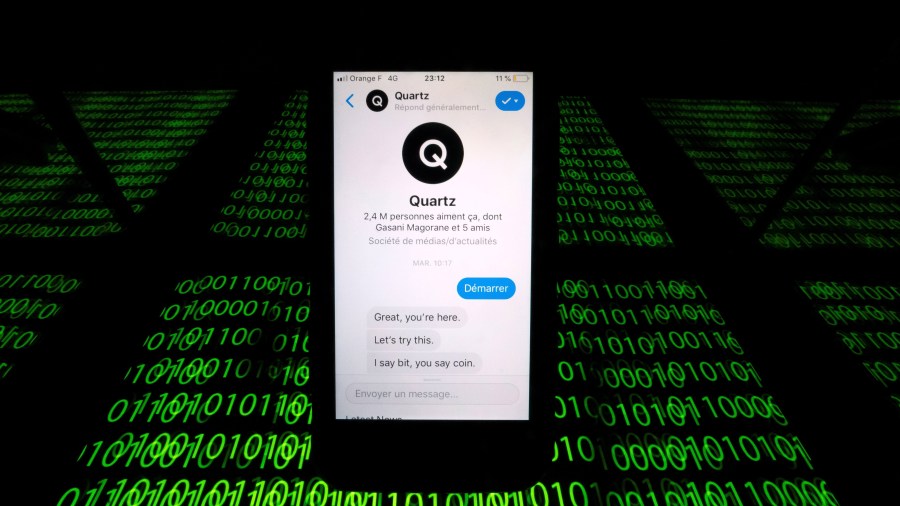Machines need to be funny if they want to sell stuff

In a tiny rehearsal room in Manhattan, Alex French is coaching a group of improv performers. He’s been performing and teaching with the improv group Upright Citizens Brigade for years. One of the things he really tries to instill in his students is the concept of “yes, and,” which is essentially saying yes to the choices your fellow performers make about a scene.
This concept of “yes, and” is also useful in French’s work on chatbots. Chatbots are growing in importance as a way of bringing in revenue: Juniper Research estimates that by the year 2023, retail sales through chatbots will reach $112 billion. That includes online chatbots and voice ordering on devices such as the Echo or Google Home. But those bots could lose customers if they can’t keep up with conversations. And some companies have learned the hard way that tone matters. So tech companies are hiring entertainers like French to make sure the bots are nimble and even funny.

French’s first gig working on a chatbot was with a weather startup, where he wrote jokes and responses for a chatbot named Poncho, a genderless cat. French, with a team of writers, decided that Poncho was a take-it-easy kind of cat who liked pizza and was a bit of a hipster. French would write responses the bot might say in reaction to certain trigger words.
“Maybe we have it set so that any time someone mentions “pizza” in their sentence, they’re going to get this specific response: PIZZA, in all caps, with an emoji with a tongue sticking out,” French said.
Poncho is no longer active. But chatbots, such as Google Assistant, Alexa and Siri, are all becoming more sophisticated, and in order to complete transactions, they need to be able to converse in a way that keeps you talking. So if you say “pizza” to one of them, the bot needs to be able to say “YES, pizza, AND do you want to make one or order one?”
Comedians are helping tech companies with that, too. Elena Skopetos also performs with Upright Citizens Brigade, and her day job is helping the Google voice assistant decide how to react in certain situations.
“If the user says something like, ‘I’m sad’ versus something like, ‘Can you fart?’ we can intuit what the intentions are there,” Skopetos said. She and her team write answers to these kinds of prompts.
“For ‘I’m sad,’ I think one of the answers we have is something like, ‘I wish I had arms to give you a hug, but for right now maybe a joke or some music might help.’”
As for “Can you fart?” the assistant takes the opportunity to make a joke about toots: “Sure, I’ll take the fault for this one, and I’ll fart again to clear all doubt.”
These scripted lines are the first steps in developing the chatbot’s responses so that it’s funny but still G rated. Cathy Pearl, who works in conversation design at Google, said the next step is to get even more detailed.
“We might actually draw out a flow,” Pearl said. “Like, ‘OK, at this point, they could either say this, or they could say that,’ and you start drawing the pathways that the person can take through this experience.”
It’s sort of like “choose your own adventure,” but for a conversation with a bot. But there’s a challenge: While companies are working to give these machines a sense of humor, they also want them to be really nice.
“Part of Alexa’s character is that she never tells a joke that will intentionally marginalize a group of people,” said Amy Jiménez Marquez, who leads the personality team behind Alexa, Amazon’s virtual assistant. Marquez is also an entertainer: She has a background in theater and performs improv. She said part of her job is being able to sidestep prompts from users like “Tell me a fat joke.”
“We answer it with jokes about margarine or butter or shortening or avocados,” Marquez said. “So we kind of try to defuse it.”
Because when you’re a bot representing a giant retail company, the last thing you want to do is make fun of your customers.
The future of this podcast starts with you.
Every day, the “Marketplace Tech” team demystifies the digital economy with stories that explore more than just Big Tech. We’re committed to covering topics that matter to you and the world around us, diving deep into how technology intersects with climate change, inequity, and disinformation.
As part of a nonprofit newsroom, we’re counting on listeners like you to keep this public service paywall-free and available to all.
Support “Marketplace Tech” in any amount today and become a partner in our mission.




















